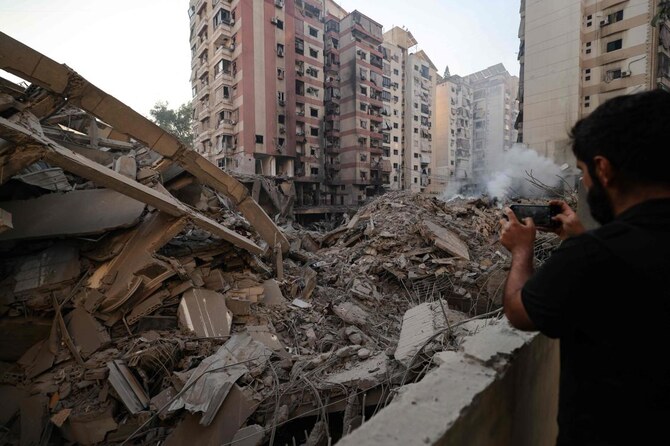BEIRUT: The Israeli military has threatened to destroy a town in Bekaa, believing it contains weapons that may be used by the Iran-backed Hezbollah.
Mayors in the town of Taraya — Ali Hamieh, Ahmed Mohsen Hamieh, and Yasser Mehdi Hamieh — have received calls from Israel informing them that Hezbollah weapons are being held in their town and if they are not removed within a day, the town will be destroyed.
Taraya is located in central Bekaa and is part of the Baalbek district, 74 km from Beirut. It is considered a supportive environment for Hezbollah and has been targeted by numerous Israeli airstrikes in the past two weeks.
This is the first time a direct threat has been made to completely destroy an entire town. Previous threats have been limited to southern towns and neighborhoods in Beirut’s southern suburbs.
Israeli attacks intensified on Saturday on Beirut’s southern suburbs and southern towns. According to a report by the Higher Defense Council, the death toll in the past 24 hours had reached 37, with 151 injured, raising the total number of victims in Lebanon since the confrontations began to 2,011 dead and 9,535 wounded.
The scope of Israeli targeting is no longer confined to a specific area, or with any restrictions.
Israeli attacks have reached the city of Tripoli in northern Lebanon, specifically the Beddawi Palestinian refugee camp, where a combat drone targeted an apartment in a residential building inside the camp, killing Hamas’ leader Saeed Atallah Ali and three members of his family.
Airstrikes have also resumed in Beirut’s southern suburbs, targeting the area of Mrayjeh and Ain Al-Sikka Square in Burj Al-Barajneh, killing two people and injuring others.
The area had not been fully evacuated because some residents believed “there were no Hezbollah security zones,” while other people had “no other place to go.”
Airstrikes for the first time have targeted the road leading to Al-Rassoul Al-Aazam Hospital in a Hezbollah stronghold.
Israeli military spokesperson Avichay Adraee told residents in neighborhoods in Beirut’s southern suburbs to evacuate in preparation for further strikes.
Israeli warplanes launched a series of raids following the warning, targeting the vicinity of Al-Qaim Mosque, Burj Al-Barajneh, the Sayed Al-Shuhada Complex, Haret Hreik, Bir Al-Abd, Al-Ruwais, Al-Abyad, Choueifat Al-Ajneha, Al-Khamseh, and Al-Marija.
The Israel Broadcasting Authority said that “Israel attacked the southern suburbs of Beirut at least six times within a span of 20 minutes.”
Rescue teams have not yet been able to clear the debris from a location that was targeted late on Thursday — a Hezbollah command center underground in Al-Marija — due to Israeli threats to target anyone who approaches the area.
It is believed that the target of the airstrike was Hashem Safieddine, a prominent Hezbollah leader and one of the leading candidates to succeed its former chief Hassan Nasrallah, who was killed in an Israeli airstrike that targeted the party’s command center a week ago.
While Hezbollah has not provided any clarification about the fate of Safieddine and his companions, Al Arabiya quoted a Lebanese security source as saying that “contact with Safieddine has been cut off since Friday’s raids” and that “he was most likely assassinated in the raids.”
Israeli airstrikes targeted the area of the Masnaa border crossing with Syria for a second day on Saturday, with crossing now only possible on foot.
Raids also targeted the road to Baalbek. A young woman lost her life due to injuries incurred during a raid on the town of Ain, located in northern Bekaa, where she was serving with the Lebanese Red Cross.
One person was killed in a raid on the Saadnayel plain in central Bekaa while two fatalities occurred as a result of a guided missile strike on a vehicle along the Marj Zebdine-Nabatieh road.
Operations conducted in the southern region on Friday night resulted in the deaths of two young men in Harouf in the Nabatieh district while one person was killed and another injured in the town of Majdal Selm in Tyre.
Three people lost their lives during a raid on a residence in the eastern town of Zawtar.
Salah Ghandour Hospital in Bint Jbeil received intense shelling following an Israeli appeal for its evacuation. The bombardment resulted in injuries to nine members of the medical and nursing staff, with the hospital later being evacuated and medical operations suspended.
Hezbollah continued its attacks on Israeli military installations. The group said it had aimed at “enemy positions and assemblies near the Dan settlement, the city of Safed, the Karmiel settlement, and the Sasa settlement using two Falaq-2 missiles.”
The Israeli military said it had “intercepted some of Hezbollah’s missiles, while others fell in open areas,” adding that “the air force will intensify its strikes on the southern suburbs.”
Hezbollah said its members were “monitoring, tracking, and responding to any hostile movements at the front line in southern Lebanon; actively pursuing Israeli soldiers in their bases and rear positions along the border in the occupied territories; (and) utilizing artillery shells and rocket barrages.”



























